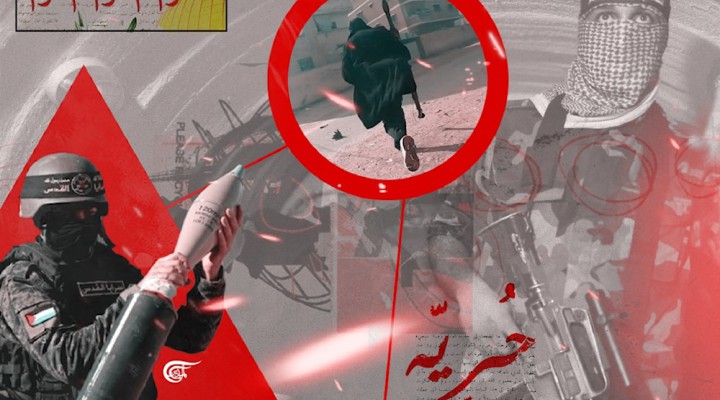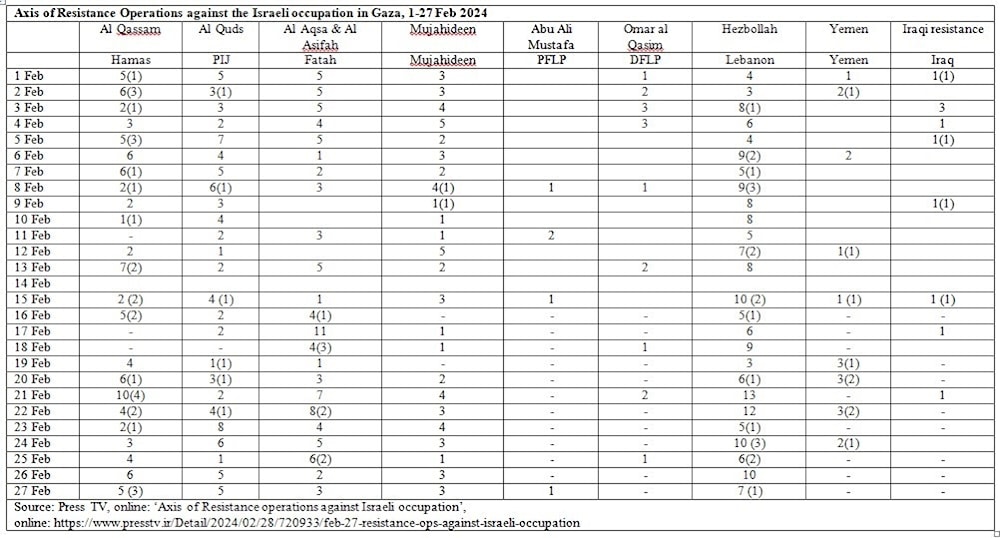Is the Gaza Resistance diminishing?

Given the inability of the Fatah-controlled Palestinian Authority (PA) to even slow down the pace of land theft and ethnic cleansing on the West Bank, or break the siege on Gaza, Palestinian public opinion has turned against the PA and has become more favourable to the Resistance.
A number of theories are circulating about the capacity of the Palestinian and allied armed resistance, as the Israeli reprisal slaughter of civilians in Gaza proceeds. Information gathered by Iran’s Press TV for the month of February 2024 allows us a better perspective. Overall, despite the widely denounced genocidal bombing and siege, there is little sign that Gaza Resistance activity is diminishing.
Press TV lists items of Resistance activity on a daily basis, with brief descriptions of each. The list includes regional resistance actions by Hezbollah (Lebanon), the Islamic Resistance in Iraq, and the Yemeni armed forces (called ‘the Houthis’ by Western governments and media, which do not want to recognise Yemen’s revolutionary government).
Most of the Palestine resistance activity listed is in Gaza, the Hezbollah activity is in the northern parts of occupied Palestine as well as parts of occupied Lebanon and Syria.
Details in the listings afford us a rough idea of which activities involved heavy weapons, such as artillery of 100mm or above, or heavy rockets (e.g. heavy Katyushas, Falaq and Burkan rockets) and long-range drones. However, this information is insufficient.
Put into numerical form, the raw data (1-27 February 2024) appears in the graphic below. It is mostly for the militia of six Palestinian Resistance factions: Al-Qassam (Hamas), Al-Quds (Palestinian Islamic Jihad), Al-Aqsa and Al-Asifah (both Fatah), Mujahideen, Abu Ali Mustafa (PFLP) and Omar al-Qasim (DFLP). Data also appears for Hezbollah, Iraq’s Islamic Resistance and the Yemeni armed forces.
Key points which can be drawn from this data are as follows:
1. Rumours that Hamas’s armed wing(al-Qassam) has been decimated are false. Al Qassam carried out multiple operations on most days in February and 88 in total, many of them with heavy weapons such as 105 and 107 shells. One-third of their operations were in the last week of February.
2. Hamas is far from alone. There were almost the same number of operations each by the Al-Quds (PIJ) and the Al-Aqsa and Al Asifah Brigades (Fatah) – 90 and 81 respectively. However, it seems that Al-Qassam may have used more heavy weapons. Overall Al-Qassam accounted for about one-quarter of the combined Palestinian Resistance operations. All this makes even more illusory the supposed Israeli aim of eliminating “Hamas”.
3. It is notable that the militia of Fatah (the dominant party of the PLO and the Palestinian Authority: PA) is very active in armed resistance, given that the Fatah-led PLO ‘recognises’ “Israel” and the Fatah-dominated PA’s prestige is at an all-time low, given its collaborationist role in recent decades. The Fatah Resistance groups (mainly the Al-Aqsa Brigades but also Al-Asifah) may be vindicating the party to some extent, in the eyes of Palestinian people.
4. Hezbollah is the most active force imposing itself on the Israeli military, with 202 operations in February. Hezbollah does not operate in the Gaza theatre but is certainly drawing a substantial part of the Israeli military away from Gaza. The descriptions at Press TV do not allow too much analysis of the weapons used, but many have included heavy weapons. It is well known that Hezbollah has heavy weapons and that much of its missile arsenal remains in reserve.
5. There is no real sign of the armed resistance flagging. The Al-Qassam, Al-Quds, Al-Aqsa and Hezbollah militia all carried out more operations in the second half of February than in the first half. Of course, this has come at a cost. Hezbollah reported on 27 February that it has lost 209 fighters in the current round. Yet, as the data shows, its operations also are not slowing down.
6. Smaller resistance groups linked to the PFLP (Abu Ali Mustafa) and the DFLP (Omar al-Qasim) carried out another 21 operations in February. Two operations were also recorded for the Nasser Salah al-Din Brigades (on 21 Feb and 22 Feb).
Given the inability of the Fatah-controlled Palestinian Authority (PA) to even slow down the pace of land theft and ethnic cleansing on the West Bank, or break the siege on Gaza, Palestinian public opinion has turned against the PA and has become more favourable to the Resistance. In November-December 2023, most of those polled (72%; 82% in the West Bank and 57% in the Gaza Strip) supported the offensive of October 7. 95% believe the Israelis committed war crimes in their attacks on Gaza; while only 10% believed Hamas committed war crimes.
The two most popular options for future governance of Gaza were Hamas (60%) or a Palestinian Unity government excluding PA ‘President’ Mahmoud Abbas (16%). Another recent poll showed that 79% of Palestinians think unelected ‘President’ Mahmoud Abbas should resign. The Fatah-led PA has not faced an election since 2006, when it lost to Hamas. Nevertheless, propped up by funding from Washington, the EU, and some Arab monarchies, Abbas and the PA still present themselves as the municipal rulers of the occupied Palestinian territories. Polls say that 80% in the West Bank and 61% in the Gaza Strip believe Hamas will succeed in returning to rule over the Gaza Strip despite the Israeli operations.
On the other side, Washington has been trying to reshape the PA and use it as a tool to control Gaza, after the US-enabled bombing ends. Hence the resignation of the entire PA Cabinet, under US pressure, but not that of the most unpopular figure, Mahmoud Abbas. Demanding even greater compliance with the Israelis will hardly add legitimacy to Abbas or the PA, in the eyes of the Palestinian population.
The Resistance is here to stay, and with even greater popular support.
https://english.almayadeen.net/articles/analysis/is-the-gaza-resistance-diminishing
 TheAltWorld
TheAltWorld 

0 thoughts on “Is the Gaza Resistance diminishing?”